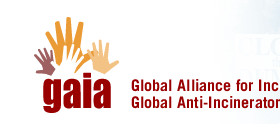





Disclaimer: Copyright infringement not intended.
Context:
Details:

The Global Alliance for Incinerator Alternatives (GAIA)
It is a worldwide alliance of more than 1,000 grassroots groups, non-governmental organizations and individuals. It aims to power a transition away from our current linear and extractive economy and towards a circular system that supports people’s right to a safe and healthy environment.
|
Confusing Terminology GAIA HYPOTHESIS: ●Gaia is a concept originating from the Gaia hypothesis, proposed by scientist James Lovelock in the 1970s. The term "Gaia" itself is derived from Greek mythology, where Gaia is the primordial goddess personifying the Earth. In the context of the Gaia hypothesis, Earth is metaphorically likened to a living organism with various interconnected systems that work together to sustain life. ●The Gaia hypothesis suggests that the Earth functions as a self-regulating system, where living organisms and their inorganic surroundings interact to maintain conditions suitable for life. In essence, Gaia views Earth as a single, self-regulating organism. GAIA HYPOTHESIS FEATURES: ●Self-Regulating: Earth keeps itself balanced, like a body maintaining its temperature or heartbeat. ●Living Organism: Everything on Earth works together, like organs in a body, to keep things just right for life. ●Interconnectedness: Plants, animals, air, water, rocks—everything is connected and affects each other. ●Inspired by Mythology: The idea is named after Gaia, the Greek goddess of the Earth. ●Big Idea: Gaia suggests Earth is more than just a bunch of stuff—it's a living system that keeps life going. |
Source
|
PRACTICE QUESTION Q) Consider the following statements regarding the Global Alliance for Incinerator Alternatives (GAIA): 1)GAIA is an intergovernmental organisation. 2)GAIA aims to promote sustainable waste management practices and alternatives to incineration. 3)GAIA operates regionally, focusing primarily on specific countries. 4)GAIA advocates for policies that prioritize waste reduction, reuse, recycling, and composting over incineration. 5)GAIA comprises over 800 member organizations from more than 90 countries. Which of the statements above is/are correct? a) 2, and 4 Only b) 2, 4, and 5 Only c) 1, 3, and 5 Only d) 2, 3, and 4 Only Answer: a) |






© 2026 iasgyan. All right reserved